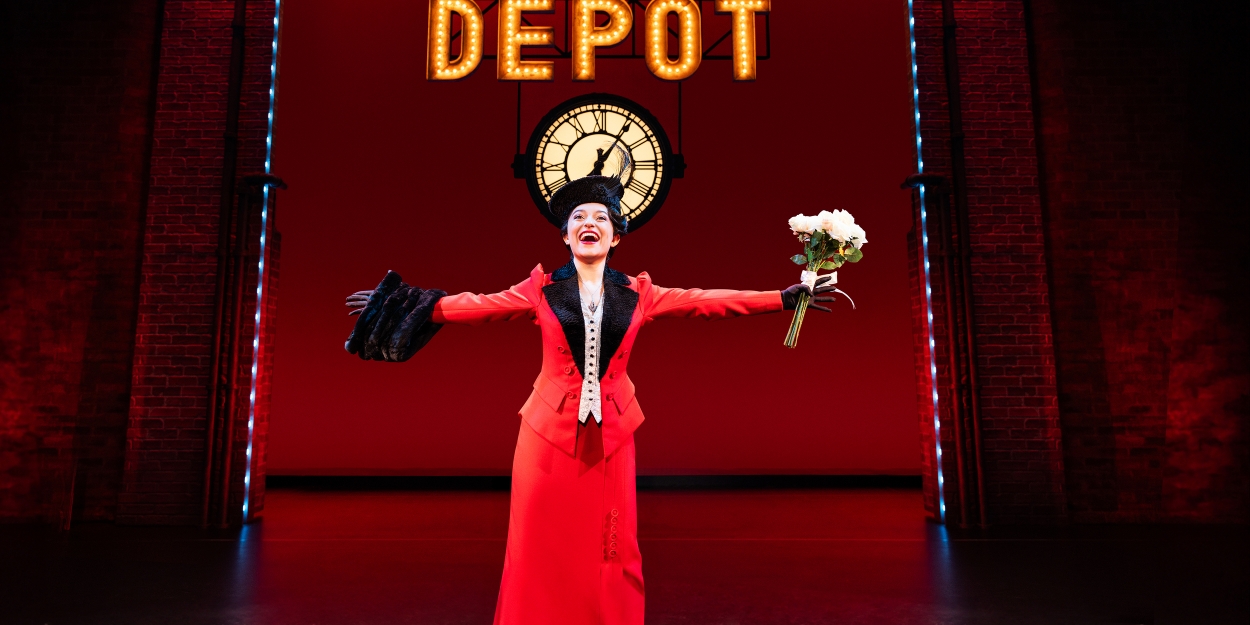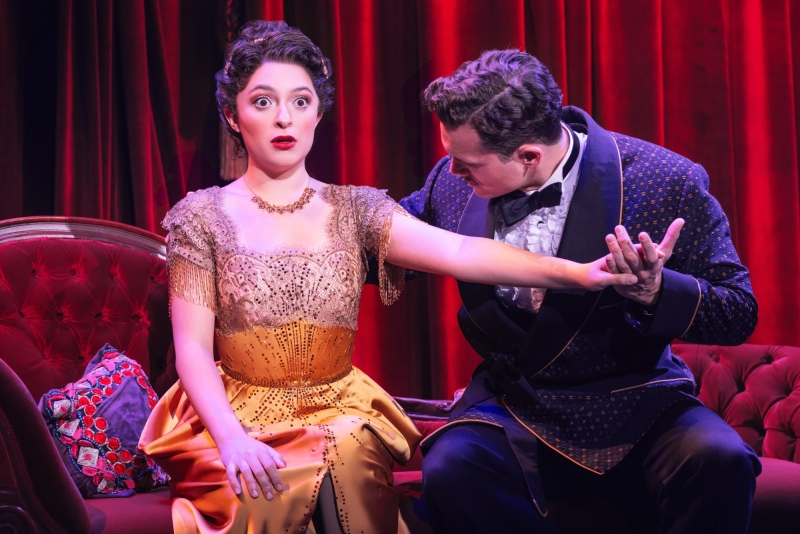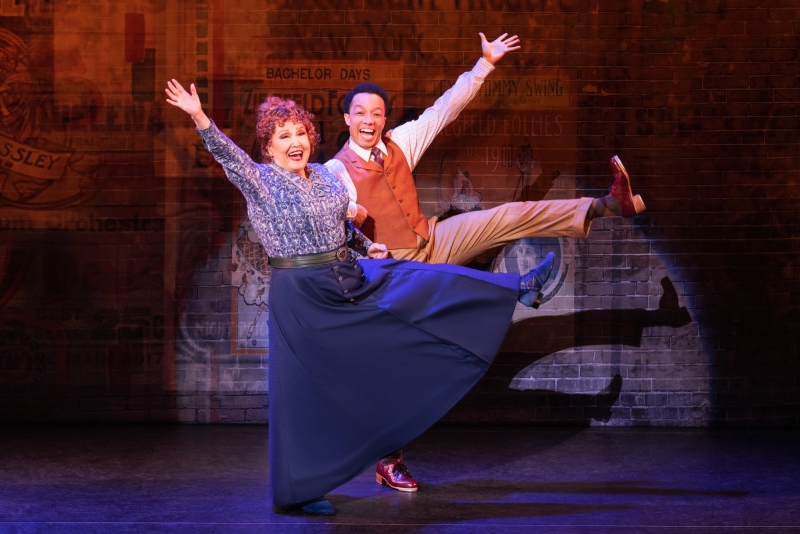Review: Katerina McCrimmon's Star Shines Bright in FUNNY GIRL Revival at Segerstrom Center
Buoyed by the spectacular, star-powered performance of its talented leading lady, this colorful new touring revival of the 1964 musical is flawed but still enjoyable.

Nearly six decades after its original 1964 production made its debut on the Great White Way, the highly-anticipated first-ever Broadway revival of the semi-biographical musical FUNNY GIRL finally made quite a splash in the theatrical world when it welcomed audiences at the August Wilson Theatre in the Spring of 2022—but, perhaps, not for its new revises and changes, but for, mostly, the contentious behind-the-scenes casting drama that plagued the production on the daily.
Now thankfully free from all of that backstage nonsense, the subsequent national touring production that launched in 2023 that has now made its way around the country for a stop at OC's Segerstrom Center for the Arts in Costa Mesa—where it continues there through June 9, 2024—should, one would think, be able to tout itself just on the merits of what is being presented to both previous fans and new audiences, without all that extra curricular hullabaloo to get in the way.
For the most part, this new touring revival—again directed by Michael Mayer and featuring a well-meaning revised book by Harvey Fierstein to accompany the memorable songs originally created by composer Jule Styne and lyricist Bob Merrill—accomplishes that.
Simply on the basis of this new, 21st-Century production, this revamped stage iteration of FUNNY GIRL (no doubt inspired by Mayer's own UK revival in 2015) feels like it genuinely has a little bit more meat in its bones and feels like it has gone through a modernized lens filter to cater slightly a bit more to today's diverse-minded audiences.
On the surface, the show looks great. The production features colorful sets designed by David Zinn and dazzling costumes designed by Susan Hilferty that beautifully complement lots of impressively-staged musical performances that range from lavish to lovely—much of which revolve around its dazzling, triple-threat star-on-the-rise Katerina McCrimmon, who plays the leading role of real-life funny lady Fanny Brice with great vocal ability and wonderful comic timing. The show really does an excellent job of showcasing her talent for essaying her character's strengths and vulnerabilities with equal aplomb.
McCrimmon is indeed a great-enough reason to come see this newly revised show, and judging from her rapturous reception during the show's OC opening night, her casting was an important "get" for a musical that hinges on its central character to be compelling and intriguing enough to carry much of the load of this star-driven show. Her presence here gives everything (and everyone) a purpose to be in her character's orbit, and that's a lot to place on one actor's make-or-break performance.
Luckily, McCrimmon handles the job with impressive chops, and sustains that stamina for its entire run time. While the OC production was once again plagued by the theater's uneven microphone/speaker dampening, McCrimmon somehow manages to bypass this hurdle to offer the audience clear dialogue delivery and powerful vocals.
So when she eventually sings "I'm The Greatest Star," you damn near believe her.

Photo by © Matthew Murphy / MurphyMade.
But McCrimmon's surface triumph, though, does a great deal of subterfuge to distract audiences from FUNNY GIRL's less positive aspects.
It must be said that, yes, palpable efforts have been made to improve the show itself aside from finding a great leading lady—from adding/subtracting/moving/augmenting the show's songs to tweaking its newly revised book to try to improve upon Isobel Lennart's somewhat unfocused original script.
But despite Fierstein's narrative efforts to add new life and contextual clarity into the show—a difficult task when you consider that the original (and amazing film adaptation) had Barbra frikkin' Streisand in the lead role, elevating everything in it up multiple levels—this new revival can't quite erase that one nagging, consistent flaw that still remains in the show until now: it's inescapable narrative choppy-ness that creates an overarching uneven pacing and structure.
Distractions of great acting and memorable music aside, there is still a hovering feeling that we are maybe witnessing incomplete bits of a life rather than seeing well-examined, expressively curated moments from a uniquely gifted but romantically unlucky woman who was, in a sense, ahead of her time.
As it stands, this new FUNNY GIRL—while genuinely entertaining—still feels like it rushes through vignettes like awards show clips, even though, to be fair, much of these vignettes are mostly very engaging if only slightly disjointed. This is especially prevalent in the second act, where the narrative occasionally loses momentum at very crucial spots.
And while most theatre die-hards would contend that, generally, film adaptations of stage musicals are often less superior to their original stage source material, I can't say that I wholeheartedly agree that this generalization is a similar case with FUNNY GIRL.
The much superior 1968 William Wyler-directed film version—perhaps wholly aware of the stage version's choppy pacing and narrative flaws—still shows that, even with this new revival, FUNNY GIRL's storytelling treatment in its cinematic iteration is still a vast improvement on the stage show's original intentions (which is a surprise considering the film's script was also written by Lennart).
Mayer and Fierstein's 2015 and 2022 revival, it would seem, attempts to bring in some of those superior improvements in the film to this new stage production, but the alterations and enhancements here feel like band-aids rather than full-on, life-saving surgical procedures (I am very much thankful, though, that the revival finally includes the film-only song "Funny Girl" into this production—which I think is a positive).
The basic foundation of the musical, of course, remains intact. As always, FUNNY GIRL tells the real-life story of groundbreaking (and glass ceiling-breaking) entertainer Fanny Brice (played beautifully by McCrimmon), a uniquely talented comedienne and actress who rose to fame in the early 20th century, first in smaller vaudeville theaters before ascending to be a headlining star in massively popular shows by Florenz Ziegfeld (played by Walter Coppage).
What's even more remarkable is that Brice became a superstar without relying on "traditional" good looks—just raw, inimitable talent—an "opinion" she herself perpetuated like a nagging devil on her shoulder.
The story begins in 1920s New York City, where young Fanny, an outspoken young Jewish girl from the Lower East Side, dreams of becoming a star, but struggles to make it in show business because she doesn't fit the traditional standard of beauty synonymous with stage stars or even, yikes, background dancers.
But despite her unconventional looks, Fanny eventually triumphs by emphasizing her comedic talent (and, since this is a musical, she wows with her singing voice, too) to break through her outer shell.
On an impulse, she auditions to be a performer at a local music hall owned by the cantankerous Mr. Keeney (David Foley, Jr.). Despite a disastrous first showing, Fanny somehow lands a spot in the ensemble after the theater's very friendly director/choreographer Eddie Ryan (the wonderful Izaiah Montaque Harris) recognizes a true, as yet untapped talent. The show sort of.. kind of… alludes that Ryan also… maybe… has a crush on Fanny, but the show squashes this notion quickly—a perplexing detail that could have added some extra layer of depth to their story.
But, be that as it may, Fanny manages to impress Mr. Keeney during her hilarious and heartfelt surprise debut performance—which happens to also catch the eye of a handsome audience member, notorious gambler Nick Arnstein (the dashing Stephen Mark Lukas, sporting 21st century abs), who visits her backstage to praise her.
Fanny, of course, giddy with receiving compliments from this charming, "gorgeous" stranger, is instantly smitten, though it seems the feeling is pretty mutual.
Even better: her unique talent and style later catches the attention of world-renowned theatrical producer Florenz Ziegfeld, who offers her a spot in his prestigious Ziegfeld Follies. Fanny's cautiously excited mom, Mrs. Brice (played with endearing pluck by Grammy-winning recording artist Melissa Manchester) is skeptical of her daughter's chances, but is hopeful that she'd succeed in showbiz despite all of her daughter's flaws.
And indeed she does—even with an opening night performance that has her going off-script with a rogue move that initially angers Mr. Ziegfeld, but, of course, the audience just loves.
As Fanny's career takes off, she reconnects with Nick and, of course, falls deeper in love with him, despite warnings from her friends and family about his nefarious reputation and supposedly shady lifestyle. Feeling that she deserves to "have a life" outside of the theater too, she (again) goes rogue and spontaneously ditches the Ziegfeld Follies tour to join Nick in a gambling trip overseas—and, later, ends up marrying him.
For his part, Nick would only ever agree to marry her if he himself had the financial equity to contribute to their partnership. This insecurity and resentment with his wife's success would later prove to be his Achilles' Heel and becomes the constant, foreboding trouble that hovers over their relationship.
Thus, as Fanny becomes an even bigger star (enjoying both critical acclaim and financial success), and just as Nick's gambling habits and unlucky investments lead him to financial trouble, their already rocky relationship is further strained, threatening their blissful facade.

Photo by © Matthew Murphy / MurphyMade.
Regardless of how the musical executes the story, it is, in the grand scheme of things, still a very intriguing one, making FUNNY GIRL a still fairly entertaining musical overall.
The wonderful, thoughtful songs written by Style and Merrill are memorable and well-integrated into the narrative, and decades later continue to be an important, enjoyable part of the show. Even newbies to the show can certainly hum a few bars of "People" and "Don't Rain On My Parade"—a testament of this show's cemented place in pop culture.
While Fanny is a well-rounded, mostly well-developed character with discernible complexities that make her both endearing and relatable, other characters—particularly Nick Arnstein—are less developed and exist just as satellites around Fanny. Of course, this being Fanny's story after all, this is understandable, but also entirely fixable—which is valiantly attempted here.
Even with Fierstein's revamps, Nick's motivations and personality are not as deeply explored, which can make his relationship with Fanny feel one-dimensional and, at times, one-sided (oh how I would have loved a backstory, even told in passing).
I did appreciate the new song added to the show, a belt-tastic solo for Lukas' Nick called "Temporary Arrangement" but it ultimately feels like a last-minute filler song—and its presence is solely to showcase the vocal talents of whichever actor is singing it (and, to be fair, Lukas does a superb job with it and does provide some personal expression directly from his character).
Aside from the admirable work presented by McCrimmon, Lukas, Manchester, and Harris, I was especially enamored by the supporting characters Mrs. Strakosh and Mrs. Meeker played by Eileen T'Kaye and Cindy Chang, respectively. The two added extra jolts of joy each time they appeared and I was there for all of it. Kudos, too, to the entire ensemble (and choreographer Ellenore Scott for some incredible production numbers that include "His Love Makes Me Beautiful" (still hilarious after all these years), "Sadie, Sadie," and "Rat-Tat-Tat-Tat."
But, overall, the show is truly all about displaying McCrimmon's brilliant, engaging performance as Fanny—and how her star-making portrayal keeps the show itself perpetually tapping. With the show's likable blend of music, humor, and melodrama—relying heavily on McCrimmon's comedic and singing talent to bring levity to the story while not shying away from the darker aspects of Fanny's personal life—FUNNY GIRL is still a definite must-see, despite its ultimately passable flaws (it should be noted, by the way, that at certain performances, Fanny is played by McCrimmon's alternate, Hannah Shankman).
And I may still be a Streisand "Stan" since seeing the movie version, but McCrimmon makes a great case for the discovery of other talented singer-actors to attempt (and succeed in) the role for future stage productions—who were never on the show Glee.
Top Photo by Evan Zimmerman, courtesy of Segerstrom Center for the Arts.
Performances of FUNNY GIRL continues at Segerstrom Center for the Arts in Costa Mesa, CA through June 9, 2024. Tickets can be purchased online at www.SCFTA.org, by phone at 714-556-2787 or in person at the SCFTA box office (open daily at 10 am). Segerstrom Center for the Arts is located at 600 Town Center Drive in Costa Mesa. For tickets or more information, visit SCFTA.org.
Comments
Videos

